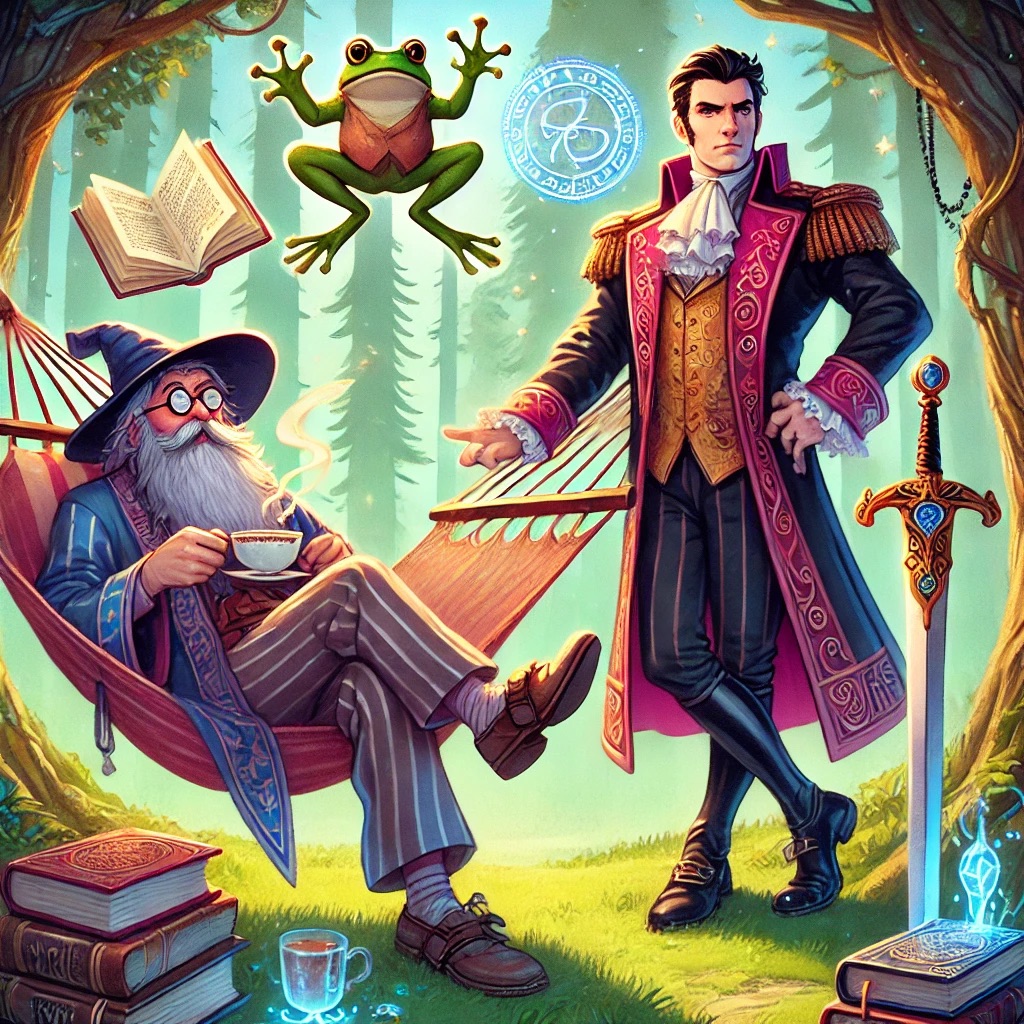Once upon a time, in a land where magic and politics often collided with a resounding crash, there was a wizard named Eldrin.
Eldrin wasn’t the typical wizard you’d imagine, he didn’t live in a crumbling tower or spend days concocting potions. No, he was more the type to take long walks in the woods, mutter to himself about quantum entanglement, and roll his eyes at anyone who tried to tell him what to do. He was a wizard of the highest order, but he didn’t like being bothered.
And then there was Lord Alaric, a member of the ruling elite. Alaric wasn’t just any noble, he was the type who had a perfectly manicured beard, an army of underlings who fawned over him, and a knack for pretending to understand magic when he had absolutely no clue. He was a master of the art of pretentiousness. One day, he heard whispers of a wizard living in the hills, and in his typical fashion, he decided that the wizard would make a fine pawn in his game of power.
Alaric marched up to Eldrin’s home, surrounded by his guards, all with their swords drawn in a dramatic, over-the-top display. He was ready to impress upon the wizard just how powerful the elite truly were.
“Wizard!” Alaric boomed, striking a pose. “I demand your allegiance to my rule. Join me, or face the consequences!”
Eldrin, who had been lounging in a hammock and sipping tea (he’d just discovered the magic of herbal infusions), didn’t even look up. “Yeah, yeah, whatever,” he muttered, taking another sip. “What’s your point?”
The guards were taken aback. Alaric, however, stood tall and puffed out his chest. “You dare ignore me, a member of the ruling elite? I am the future of this land, and you”
“Look, buddy,” Eldrin interrupted, still not bothering to rise from his hammock. “If you’re just here to make a speech, you can go ahead and do that somewhere else. I’m busy with tea.” He waved a hand dismissively.
“I will not be dismissed like this!” Alaric said, his face growing red. “You think your magic can protect you from the might of my family’s influence? You are nothing compared to”
“Oh for the love of—” Eldrin sighed and finally stood up. “Okay, look, I’m not a pawn in your little game. I don’t care about your political power, your armies, or whatever nonsense you’re trying to sell. I just want peace and quiet.”
Alaric, stunned by Eldrin’s indifference, snapped his fingers and summoned a sword. “I’ll show you the might of the elite!” he shouted, swinging the blade with all the grace of a drunken knight.
Eldrin casually flicked his wrist, and the sword vanished into thin air, leaving Alaric holding an empty hilt. “Seriously? We’re doing this? Fine. You want a lesson in magic, here it is.” Eldrin snapped his fingers, and Alaric’s pants turned into a giant frog.
“What in the—” Alaric yelped, jumping around in panic. “What did you do?!”
“It’s a minor illusion,” Eldrin said, deadpan. “You’ll be fine. It’s just a frog for a little while.”
Alaric looked at the frog-clad pants and tried to maintain his dignity. “This is outrageous! I will have you thrown in the dungeon for—”
“I’m a wizard,” Eldrin said, unamused. “I don’t really do dungeons. Or jails. They don’t have proper lighting, and the vibe is terrible.”
For the next few hours, Alaric tried everything, bluster, threats, and even bribing Eldrin with a small army of well-dressed servants. But nothing worked. Eldrin remained unfazed, drinking his tea and occasionally turning Alaric’s various accessories into random animals. A pair of boots became a cat. A belt buckle transformed into a bird. And his hat? A watermelon.
Eventually, Alaric sat down, defeated. “Okay, okay, you win,” he said, rubbing his temples. “I don’t get it. Why don’t you care about power? About ruling?”
Eldrin leaned back in his hammock again, finally looking Alaric in the eye. “Because power is just a game, my friend. It’s a game you’ve been taught to play your whole life. You think it matters who has the biggest castle or the sharpest sword, but none of it means anything if you’re constantly fighting for it.”
Alaric blinked, not expecting this kind of response. “So… what, you think I should just… walk away from it all?”
“If you’re tired of being hunted, yes. Walk away,” Eldrin said, sipping his tea. “The moment you stop trying to be the biggest fish in the pond is when you realize the pond is just a pond, and there’s a whole ocean out there. But if you keep chasing the same things over and over, you’ll just keep running in circles.”
Alaric paused. For the first time, he felt… something. It wasn’t quite clarity, but it was a start. “And you’re okay with… being just… this?” he gestured vaguely at Eldrin’s relaxed demeanor.
Eldrin raised an eyebrow. “What else is there? Power for the sake of power is empty. But knowing who you are, and living how you want… that’s real freedom.”
Alaric thought about it for a moment, then sighed. “I’m not going to lie, I still don’t fully get it. But I think I’m starting to understand.”
Eldrin grinned. “Good. Now, how about we both have some tea and stop trying to turn each other into frogs? Deal?”
Alaric smiled for the first time that day, realizing that the wizard’s strange way of thinking might not be so crazy after all. “Deal.”
And so, the wizard and the elite found a strange, unexpected common ground. No epic battle. No grand speeches. Just two people, one with magic, the other with influence, realising that maybe, just maybe, the key to everything was simply letting go of the need to control and starting to understand each other.
How’s that for a twist in the tale?
